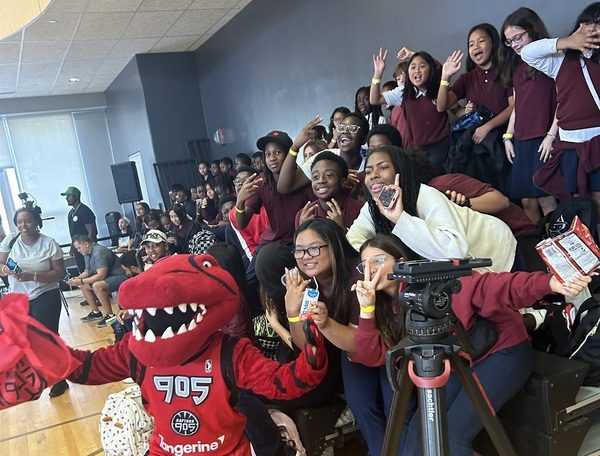BY SIMONE J. SMITH
“Hi, it’s Dr. Matthews. Are you sitting down?”
“Yes, I’m sitting. What’s going on?”
A pause, heavy and long. The clock ticks audibly in the background.
“The results are back. I’m afraid it’s cancer…”
All of a sudden, the room feels like it shrinks. Everything becomes a little quieter, more distant. You blink, the words hitting hard. It is the type of news that you never expected. It feels unreal, like one day everything was fine, and then suddenly, everything changed. It’s like the world keeps moving, but you are stuck in this limbo.
Each and every one of us, in one way or another, has been directly or indirectly affected by cancer. Whether it is a loved one, a friend, or a personal battle, cancer leaves a mark on us all. That’s what made being invited to The Princess Margaret Hospital’s 2nd Annual Battleground TIFF Basketball Event so meaningful. It was an opportunity to witness something truly powerful—stars, athletes, and students from across the city of Toronto and Ontario came together for one united cause: supporting cancer research.
On September 12th, 2024, from 10:00 am to 2:00 pm, Regent Park Community Centre (402 Shuter St, Toronto) became the hub of excitement and hope. Celebrities, popular Canadian athletes, and students gathered for a few hours of fun, entertainment, and of course, basketball.
The day began with a prayer, and the Land Acknowledgement. For the rest of the day, the crowd was kept entertained with basketball challenges, a mental health presentation with Kausalya Vimal, a dance performance by the sensational Simone, and concluded with a meet and greet where students were able to interact with their favourite athletes. The staff and students had the honour of meeting 2024 Olympic 4x100m gold medalists Andre De Grasse, Brendon Rodney, and Jerome Blake, as well as Mayor Olivia Chow, Deputy Mayor Ausma Malik, the Honourable Marci Ien, Devo Brown, and other prominent personalities and celebrities.
“I have felt the devastating impact of cancer in my life,” shares Mayor Olivia Chow who you could tell was having a great time interacting with the crowd. “I have had cancer, no problem! My late husband died of cancer.”
When I arrived, it was heartwarming to see familiar faces in the crowd. Actor Ronnie Rowe, one of our beloved Classic Men, was showing off his basketball skills. Matt U, a talented singer and performer, traveled all the way from the United States to join the event. Of course, our newest Canadian heroes—Andre De Grasse, Jerome Blake, and Brendon Rodney—brought their fierce competitive energy to the court. It was inspiring to watch.
“We are all affected, directly or indirectly by this disease,” explains the host of the event Emmanuel Kabongo, whose mother is currently being treated at Princess Margaret Hospital. “So, to bring together people in entertainment whether it is: basketball, or other sports, film and tv, acting, and performers, they all love this game and want the opportunity to give back.”
“I love this. If I were a kid, I would love this opportunity to meet one of my favourite athletes, so I am happy to be here for them, and to interact with them,” Andre De Grasse shared with reporters in the brief moments that he was surrounded by adorning fans.
The real magic came from the students. They were engaged and excited, cheering and clapping throughout. The event was packed with entertainment—dances, spoken word poetry, the thrilling two-ball and three-point challenges, and the highlight of the day, the All-Star Game. Watching their heroes battle it out on the court, the students were more than just spectators, they were part of a movement, part of something bigger than basketball.
Cancer takes, but it also reveals. It shows us how strong we are as individuals, as families, and as a community.

